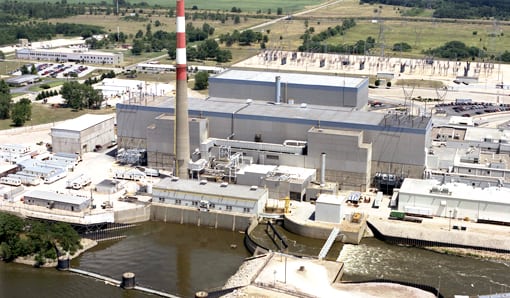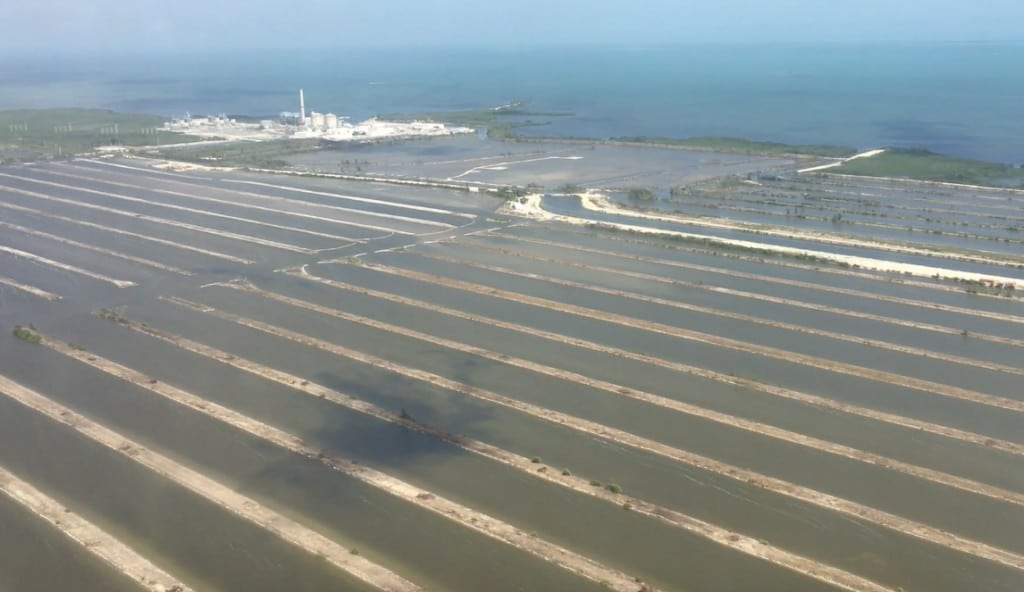Nuclear Milestones Confront Exelon, FPL, and TVA
Five nuclear projects-two old, one new, two planned-faced milestones this week as their owners confronted the realities of the U.S. nuclear market.
Exelon Seeks Nuclear SupportIn Illinois, Exelon again warned that the long-challenged Clinton and Quad Cities plants would shut down unless the Illinois legislature passed a bill that would provide economic support for the two plants.
 1. Challenged. Exelon's Quad Cities plant will shut down unless the state can provide economic support to keep it profitable, the utility said. Courtesy: Exelon
1. Challenged. Exelon's Quad Cities plant will shut down unless the state can provide economic support to keep it profitable, the utility said. Courtesy: Exelon"Unfortunately, we are also announcing plans to retire the economically challenged Clinton and Quad Cities nuclear plants in Illinois on June 1, 2017 and June 1, 2018, respectively, without passage of adequate legislation in the current spring legislative session and Quad Cities clearing in the 2019-20 RPM capacity auction," Exelon's President and CEO Chris Crane said in the company's first quarter earnings call.
The plan would pay the plants to continue operating, making up the difference between their operating costs and revenue. The two plants have had difficulty clearing PJM capacity auctions, and Exelon has warned repeatedly that they are losing too much money to continue operating.
Prospects for the legislation are uncertain, according to observers, and previous attempts to pass support for the plants have failed. In addition, state attempts to financially support economically challenged power plants have run into stiff opposition from ratepayer groups and-more critically-federal regulators. The Federal Energy Regulatory Commission in late April blocked an Ohio plan that would have supported First Energy's Davis-Besse nuclear plant in addition to several aging coal plants, and the U.S. Supreme Court a week earlier struck down similar programs in Maryland and New Jersey that would have supported construction of new power plants in those states.
FPL Fights for Turkey PointMeanwhile in Florida, Florida Power & Light's (FPL's) bid to build two more units at its Turkey Point Nuclear Plant south of Miami continues to run into opposition. On April 20, a state court reversed approval for a new transmission line that would carry power from the two reactors. Two days later, the state Department of Environmental Protection (DEP) approved a plan to deal with serious saline leaks from the plant's cooling canals. That problem has been brewing for years, drawing charges that FPL has dragged its feet in arresting the leaks and that the DEP has been too lenient in its oversight of the plant.
 2. Leaky. Florida Power & Light's Turkey Point plant has been struggling with saline leaks from its extensive network of cooling water canals. Courtesy: Southern Alliance for Clean Energy
2. Leaky. Florida Power & Light's Turkey Point plant has been struggling with saline leaks from its extensive network of cooling water canals. Courtesy: Southern Alliance for Clean EnergyRather than using the cooling canals for the two new units, FPL wants to use treated wastewater that would then be injected deep underground. This is an approach that has been used successfully at other plants in the state, though not at the scale FPL plans for Turkey Point Units 6 and 7.
FPL is seeking another $22 million to continue development work on top of the $281 million it has already billed ratepayers in pre-construction and pre-licensing costs (though the total amounts to less than $0.50 per month for the average customer). Assuming it receives a license to build and operate the two units from the Nuclear Regulatory Commission (NRC), FPL says they could come online by 2027 and 2028 at a total cost of up to $20 billion.
Watts Bar Prepares for CriticalityOne rare bright spot for U.S. nuclear came in Tennessee as the Tennessee Valley Authority (TVA) said on May 3 that it expects its newly completed Watts Bar 2 project to achieve first criticality later this month and reach commercial operation this summer.
 3. Almost there. Unit 2 at Tennessee Valley Authority's Watts Bar Nuclear Power Plant will come online this summer, the utility said. Courtesy: TVA
3. Almost there. Unit 2 at Tennessee Valley Authority's Watts Bar Nuclear Power Plant will come online this summer, the utility said. Courtesy: TVACompleting Watts Bar 2 took TVA nearly 40 years. Work on Watts Bar 1 began in the 1970s, but TVA halted construction on Unit 2 in 1985. The partially finished reactor was mothballed with work roughly 60% complete. Work finally resumed in 2007, though substantial refurbishment and upgrades of the project's '70s-era systems were necessary. Construction was substantially completed last year, and the NRC gave permission for startup in July.
Not all is well with TVA's nuclear fleet, however, as the utility said on May 5 that it was formally abandoning and putting up for sale another half-finished plant, the two-unit Bellefonte site near Hollywood, Ala. TVA withdrew its application for NRC licenses for Units 3 and 4 at the site in February and now plans to dispose of the property entirely.
TVA said the total cost for Watts Bar 2 was $4.7 billion.
-Thomas W. Overton, JD is POWER associate editor (@thomas_overton, @POWERmagazine).
The post Nuclear Milestones Confront Exelon, FPL, and TVA appeared first on POWER Magazine.